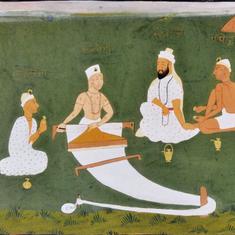After leading his team to a tense and improbable one-run victory over Bangladesh at Bengaluru in a Super 10 match at the World Twenty20 on Wednesday, an unusually cranky Mahendra Singh Dhoni turned up for the post-match press conference. On a personal level, it had been a good day – some quick-thinking from him at the fag end of the match had derailed Bangladesh’s chase and brought India victory from the jaws of defeat.
However, the victory did not seem to have buoyed his spirits. This was his reply to the very first question lobbed at him:
Mujhe pata hai aapko khushi nahi hui hai ki India jeet gaya. Aapki awaz se, aapki tone se, aapki sawaal se aisa lag raha hai ki aapko khushi nahi aaye ki India jeet gaya aaj. (I know that you are not happy that India has won today. Your voice, your tone, your question – all of these indicate you are not happy that India has won today).
Quite an explosive reply from someone usually known to be impassive. Was the reporter's question offensive enough to merit such a reply? Here is the original query, roughly translated from Hindi:
There was talk about winning this match comprehensively and boosting the net run rate. That did not happen and India managed to escape with a win in a match they almost lost. How satisfied are you with the victory?
On any other day, this question could be dismissed as a frivolous one, especially since it had come immediately after captivating victory. However, this is what the Indian captain had said on the eve of the match against Bangladesh.
In the first game, our run rate went down. So it’s not only about winning, but you have to take care of the run rate at some point.
For the record
Dhoni was not the first to criticise a sports journalist that evening. During the course of the match, Bollywood legend Amitabh Bachchan brought a hint of patriotism into the picture by tweeting that Indian commentators should focus more on the Indian players than the opponents.
T 2184 - With all due respects, it would be really worthy of an Indian commentator to speak more about our players than others all the time.
— Amitabh Bachchan (@SrBachchan) March 23, 2016
It is perhaps a good time to set the record straight. The job of a sports journalist, or any journalist in particular, is not to be “happy” or “sad” when a team wins or loses, or focus on one team or the other. The fundamental premise of journalism rests on the pillars of objectivity and neutrality.
Unfortunately, when Mahendra Singh Dhoni and Amitabh Bachchan question this very objectivity, it becomes a case of “you’re either with us or you’re against us". In this heated air of pseudo-patriotism, it is important that this is spelled out – journalists are not obligated to sing the praises of India, Pakistan or any sporting team anywhere. As journalist Sharda Ugra wrote earlier, the stock in trade of a sports journalists is not unconditional support – that is reserved for the millions of adoring fans. The journalist's job is to report the facts, ask the tough questions and try and provide an informed analysis – not act as pseudo-cheerleaders for their team.
Dhoni has captained India for over a decade and is not new to the job. In fact, the inscrutable and enigmatic nature of his comments have evoked both mirth and applause in equal measure over the years. It was certainly not beyond him to answer the question, however unpleasant it might have sounded to him, in a far more dignified manner.










